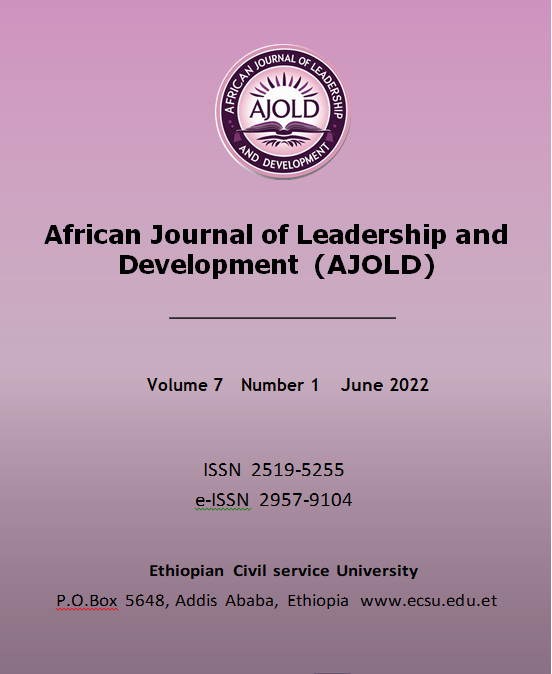An Assessment of Critical Success Factors in Thesis Writing: The Case of Ethiopian Civil Service University and Addis Ababa University
DOI:
https://doi.org/10.63990/2022ajoldvol7iss1pp83-106Keywords:
Thesis writing, Quality, Management, Factors, ChallengesAbstract
The quality of education continues to challenge Ethiopian higher education. This study has explored and account thesis writing, its governance, factors, and critical challenges in Ethiopian public universities, taking Addis Ababa University and Ethiopian Civil Service University as case. The study employed a concurrent triangulation mixed research design. Both quantitative and qualitative data were collected from sample public universities. Thus, in the case of Ethiopian Civil Service University, from the total graduate degree students of 2014, 334 students were sampled; and in the case of Addis Ababa University, 388 sample students were sampled—in total 722 survey questionnaires were collected. Qualitative data using a semi-structured interview were generated from 40 participants drawn from students and teachers in these two sample universities. The descriptive analysis of this study revealed that advisor’s capacity was found slightly higher than average in both sample universities (ECSU, 3.32; AAU, 3.68; Total, 3.51). The level of knowledge gained in the process of thesis writing in ECSU (Mean value, 3.19) and AAU (Mean value, 3.16) were found to be significant. The effectiveness of management practices was found below average (Mean value, 2.78). Written feedback is found to be the dominant mode of communicating comment by advisors in the process of thesis writing— while provision of feedback through face-to-face communication is found to be very minimal in both institutions. The quality of feedback, measured in terms of timeliness (Mean value, 2.34), degree of detail (Mean value, 2.40), comprehensiveness (Mean value, 2.40), and constructiveness (Mean value, 2.39)—were found to be far below average (total mean value, 2.38). This study also came up with evidence that a significant number of students, 78 percent of respondents, have received external technical support from family, friend, colleagues, and classmates in the process of thesis writing. This evidence corroborates the fact that external support plays a significant role in thesis writing. The overall thesis writing and management in public higher education institutions suffer significant limitations, including the absence of guiding documents in research and thesis writing as well as the existence of loose monitoring and evaluation system on the key actors— advisors and students. The management of thesis feedback in general, the guidance, documentation, utilization, and monitoring were found to be ineffective. Advisors commitment is also inhibited by poor incentive mechanism in place. Students lack key set of critical skills, including English language and writing. Last but not least, the lack of vibrant research culture and practice in both institutions were found to play an inhibiting role for effective thesis writing in higher education institutions. In order to ensure the quality of thesis writing, leaders and academicians is better to consider the following measures— to prepare and execute high quality guiding documents and protocols for research; to launch an effective feedback management system; to provide performance based incentive; to strengthen effective monitoring and follow up on students and advisors; to enhance students awareness through training; to avail digital and analytical resources; and, last but not least, to conduct permanent seminars on research, writing, and methods.
Downloads
Published
How to Cite
Issue
Section
License
This work is licensed under a Creative Commons Attribution-NonCommercial 4.0 International License






